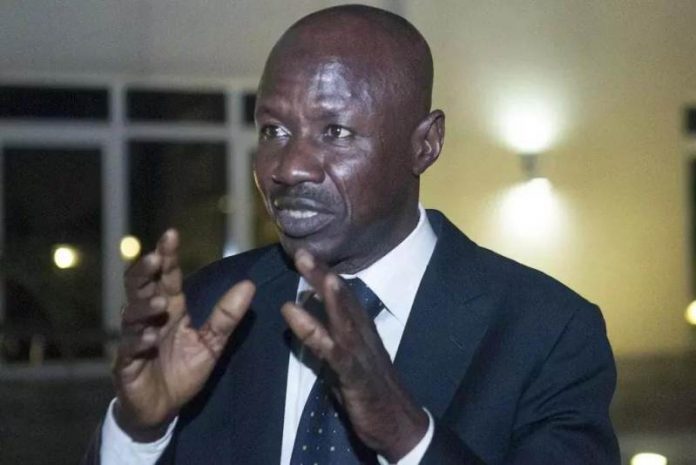An Abuja Division of the Federal High Court has put paid to the hope of the acting chairman of the Economic and Financial Crimes Commission (EFCC), Mr. Ibrahim Magu to be confirmed as the substantive head of the anti-graft agency.
The court’s decision was confirmed in Abuja by the chairman of the Senate Committee on Media and Public Affairs, Aliyu Sabi-Abdullahi.
The lawmaker who made a copy of the ruling available to journalists announced that the court had ruled that the Senate has the powers to confirm or reject Magu’s appointment
Magu was nominated by President Muhammadu Buhari twice. In both times, the Senate rejected the nomination.
According to the document, Justice John Tsoho of the FHC ruled that the EFCC was wrong in its assumption that the Senate was only there to confirm any choice made by the executive.
The judge said the Senate has the powers to ensure that only suitable persons are appointed to the position of chairperson for the anti-corruption agency.
The suit, marked FHC/ABJ/CS/59/2017, was filed by a lawyer, Oluwatosin Ojaomo, against the Senate President, Bukola Saraki; and the Attorney General of the Federation and Minister of Justice, Abubakar Malami (SAN).
Ojaomo who approached the court through an originating summons, had sought relief that the Senate lacked the powers to reject Magu’s appointment.
Tsoho, who ruled on the matter on January 15, 2018 said: “The plaintiff raised two issues in the written address for determination, to wit: Whether or not the 1st defendant (Saraki) can reject a valid statutory appointment made by the President of the Federal Republic of Nigeria to the Office (of the Chairman) of the Economic and Financial Crimes Commission in accordance with the provisions of the EFCC (Establishment) Act, 2004 and whether or not the 1st defendant is bound by the provisions of the EFCC Act, 2004, with respect to the confirmation of any appointment made by the President of the Federal Republic of Nigeria to the office of the Chairman of the EFCC.”
He expressed his doubts about the locus standi of the plaintiff, said “nevertheless, the court will consider the merits of the issues raised for determination by the plaintiff.”
“Issue one borders on the power of the Senate in respect of statutory appointment under the EFCC Act referred to it by the President. The relevant provision relating to appointment of the Chairman of the EFCC is Section 2 (1) and (3) of the EFCC (Establishment) Act, 2004.
“Section 2 (3) provides as follows: The chairman and members of the commission other than ex-officio members shall be appointed by the President and the appointment shall be subject to the confirmation of the Senate.
“Firstly, the use of the word ‘shall’ in legislation usually denotes mandatoriness. Therefore, while the plaintiff recognises the use of the word ‘shall’ as conferring mandatory and unqualified powers on the President to appoint the Chairman of the EFCC, sight must not be lost that the same word is used in respect of confirmation by the Senate of such appointment. Therefore interpretation of the word ‘shall’ should logically have the same effect regarding both situations.
“More importantly, the expression ‘subject to’ used in Section 2 (3) of the EFCC Act is very instructive. The expression ‘subject to’ has been interpreted to mean liable, subordinate, subservient, or inferior to; governed or affected by; provide that or provided; answerable for. It has been categorically stated that the phrase ‘subject to’ introduces a condition, a restriction, a limitation, a proviso,” he added.
On the second issue, Tsoho stated that there was no doubt that the 1st defendant was bound by the provisions of the EFCC Act with respect to appointment of the chairman of the EFCC by the president.
Tsoho added, “The point must be made that it is trite law generally, that where a plaintiff’s claim is unchallenged and uncontroverted, the court will accept the available evidence and act on it.”
Reacting to the judgment, Sabi-Abdullahi declared: “We are pleased with this judgment and we want to salute Nigeria’s judiciary for always rising up to the occasion to protect our democracy and deepen our democratic processes.”
“The Senate wants to say that we are convinced and hoping that by this judgment, the executive will be guided to uphold the rule of law and do the needful so that we can resolve this unfortunate situation in the overall interest of our people.”




























































